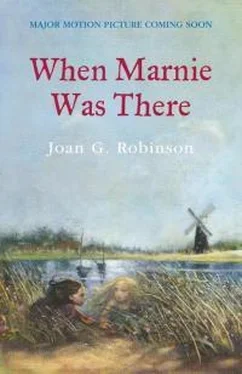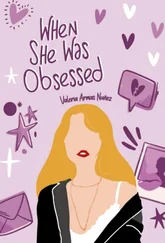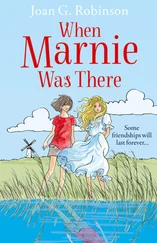Джоан Робинсон - When Marnie Was There
Здесь есть возможность читать онлайн «Джоан Робинсон - When Marnie Was There» — ознакомительный отрывок электронной книги совершенно бесплатно, а после прочтения отрывка купить полную версию. В некоторых случаях можно слушать аудио, скачать через торрент в формате fb2 и присутствует краткое содержание. Год выпуска: 2014, Издательство: HarperCollins Publishers, Жанр: Старинная литература, на английском языке. Описание произведения, (предисловие) а так же отзывы посетителей доступны на портале библиотеки ЛибКат.
- Название:When Marnie Was There
- Автор:
- Издательство:HarperCollins Publishers
- Жанр:
- Год:2014
- ISBN:нет данных
- Рейтинг книги:5 / 5. Голосов: 1
-
Избранное:Добавить в избранное
- Отзывы:
-
Ваша оценка:
- 100
- 1
- 2
- 3
- 4
- 5
When Marnie Was There: краткое содержание, описание и аннотация
Предлагаем к чтению аннотацию, описание, краткое содержание или предисловие (зависит от того, что написал сам автор книги «When Marnie Was There»). Если вы не нашли необходимую информацию о книге — напишите в комментариях, мы постараемся отыскать её.
When Marnie Was There — читать онлайн ознакомительный отрывок
Ниже представлен текст книги, разбитый по страницам. Система сохранения места последней прочитанной страницы, позволяет с удобством читать онлайн бесплатно книгу «When Marnie Was There», без необходимости каждый раз заново искать на чём Вы остановились. Поставьте закладку, и сможете в любой момент перейти на страницу, на которой закончили чтение.
Интервал:
Закладка:
“A-ah, that’s my biddy,” said Mr Pegg, taking her hand and patting it absent-mindedly. “And how’s your foster-ma keeping, eh?”
Anna looked at Mrs Pegg.
“Your mum, my duck,” said Mrs Pegg quickly. “Sam’s asking if she’s well.”
“My mother’s dead,” said Anna stiffly. “She died ages ago. I thought you knew.”
“Yes, yes, my maid. We knowed all about that,” said Sam, gruffly kind. “And your gran too, more’s the pity.” – Anna’s face stiffened even more – “That’s why I said your foster-ma – Mrs Preston. Nancy Piggott as she used to be. She’s your foster-ma, ain’t she? A good woman, Nancy Preston. Always had a kind heart. She’s a good ma to you, I’ll be bound. Keeping nicely, is she?”
“She’s very well, thank you,” said Anna primly.
“But you don’t like me calling her ‘ma,’ eh? Is that it?” said Sam, his eyes crinkling up at the corners.
“No, of course she don’t!” said Mrs Pegg. “Ma’s old fashioned these days. I expect you call her ‘Mum’, don’t you, love?”
“I call her ‘Auntie’,” said Anna, then mumbled as an afterthought, “sometimes.” It was difficult to know how to explain that she seldom called Mrs Preston by any name at all. There was no need, it wasn’t as if there was a crowd of them at home. Only Mr Preston, who called his wife Nan, and occasionally Raymond, who worked in a bank now he was grown up and always called his mother “Mims”, or occasionally “Ma” to be funny. Anna thought “Mims” was a silly name to call your own mother… She stood there now in front of Mr Pegg’s chair, her eyes troubled, wondering what to say next.
Mrs Pegg came to the rescue. “Any road, I’m sure she’s as good as a mother to you, whatever you call her,” she said in her downright, comfortable way. “And I’m sure when all’s said and done you love her almost as much as if she was your own mother, don’t you?”
“Oh, yes!” said Anna. “More,” and felt a sudden pricking behind the eyelids as she remembered her last sight of Mrs Preston running to keep up with the train and reminding her about the postcard.
“That’s right, then,” said Mrs Pegg.
“I’ve got a postcard to post,” said Anna, her voice coming out suddenly loud – she had been so afraid of it cracking – “will you show me where to post it when I’ve written it?”
Mrs Pegg said yes, of course she would. Anna could write it now in the front room while she got tea ready. “Come you here,” she said, “and I’ll show you.” She wiped her hands down the side of her dress and showed Anna to a room on the other side of the passage. “There’s a little table in here under the windie.”
The tiny room, over-full of furniture, was in half darkness. Mrs Pegg pulled back the curtains and moved a potted palm from the small bamboo table. Then she bent admiringly over a large white bowl full of pink and blue artificial flowers, which half filled the window.
“Wonderful, ain’t they?” she said, blowing the dust from the plastic petals. “Everlasting.”
She gazed at them for a moment, wiping the scalloped edges of the boat-shaped bowl with a corner of her dress, then smiled at Anna and went out, closing the door behind her.
This must be the best room, thought Anna, as she tiptoed carefully over the polished linoleum and slippery hearthrug; like the lounge at home, which was only used at weekends or when there were visitors. But very different.
She sat down at the bamboo table and brought out her postcard addressed to Mrs Stanley Preston, 25 Elmwood Terrace, London, and wrote on the other side, Arrived safely. It’s quite nice here. My room has a sloping ceiling and the window is on the floor. It smells different from home. I forgot to ask can I wear shorts every day unless I’m going somewhere special?
She paused, suddenly wanting to say something more affectionate than the conventional “love from Anna”, but not knowing how to say it.
From the kitchen came the low rumble of voices. Mrs Pegg was saying to Sam, “Poor little-old-thing, losing her mother when she was such a mite – and her granny. It’s a pity she’s so pale and scrawny, and a bit sober-sides as well, but I expect we’ll rub along together all right. She’s taking her time over that postcard, ain’t she? Had I better tell her tea’s ready?”
In the front room Anna was still sucking her pen. Outside, beyond the great boat-shaped bowl that nearly filled the window ledge, she could see glimpses of the tiny garden dreaming in the sunshine, bees still buzzing in and out of the bright flowers. Inside, as imprisoned as the bluebottles that crawled up and down inside the closed window, she sat staring at the plastic hydrangeas, wondering how to tell Mrs Preston that of course she loved her, without committing herself.
By the time Mrs Pegg had come to the front-room door and said, “Tea’s ready, lass!” she had decided on “tons of love” instead of just “love”, and added a P.S. The chocolate was lovely. I’ve saved some for tonight.
That, she knew, would please Mrs Preston without seeming to promise anything. After all, she still might not always feel loving when she got home again.

Chapter Three
O
N THE
S
TAITHE
“JUST UP THE lane and turn left at the crossroads,” said Mrs Pegg. “Post Office is only a little way up. And the road to the creek’s on the right. Go you and have a look round.” She nodded encouragingly and turned back indoors.
Anna found the Post Office – which to her surprise was a cobbled cottage like the Peggs’, with a flat letterbox in the wall – and posted her card. Then she walked back to the crossroads. She felt free now. Free and empty. No need to talk to anyone, or be polite, or bother about anything. There was hardly anyone about anyway. A farm worker passed her on a bicycle, said “Good afternoon,” and was gone before she even had time to show her surprise. She gave a little skip and turned down the short road to the staithe, and saw the creek lying ahead of her.
There was a salty smell in the air, and from the marsh on the far side of the water came the cries of seabirds. Several small boats were lying at anchor, bumping gently as the tide turned. In that short distance she seemed to have come on another world. A remote, quiet world where there were only boats and birds and water, and an enormous sky.
She jumped at the sudden sound of children’s voices. There was laughter, and shouts of, “Come on! They’re waiting!” and a group of children appeared round the corner of the staithe. Five or six boys and girls of different ages in navy blue jeans and jerseys. Immediately Anna drew herself up stiffly and put on her ‘ordinary’ face.
But it was all right, they were not coming her way. They ran, shouting and jostling each other to a car drawn up at the end of the road, and climbed in. Then the doors slammed, the car reversed, and as it drove past her up to the crossroads she had a glimpse of a man at the wheel, a woman beside him, and the children all bobbing about in the back, talking excitedly.
It was very quiet when they had gone.
“I’m glad,” she said to herself. “I’m glad they’ve gone.
I’ve met enough new people for one day.” But the feeling of freedom had changed imperceptibly to one of loneliness. She knew that even if she had met them they would never have been friends. They were children who were ‘inside’ – anyone could see that. Anyway, I don’t want to meet any more people today, she repeated to herself-hardly realising that Mr and Mrs Pegg were the only people she had spoken to since she left London.
Читать дальшеИнтервал:
Закладка:
Похожие книги на «When Marnie Was There»
Представляем Вашему вниманию похожие книги на «When Marnie Was There» списком для выбора. Мы отобрали схожую по названию и смыслу литературу в надежде предоставить читателям больше вариантов отыскать новые, интересные, ещё непрочитанные произведения.
Обсуждение, отзывы о книге «When Marnie Was There» и просто собственные мнения читателей. Оставьте ваши комментарии, напишите, что Вы думаете о произведении, его смысле или главных героях. Укажите что конкретно понравилось, а что нет, и почему Вы так считаете.












